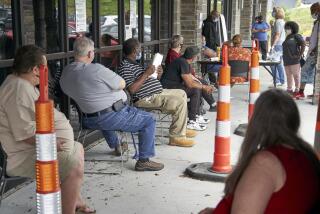Older Workers Flock to Computer Training Programs
- Share via
NEW YORK — Companies that employ large numbers of older workers claim that seniors are acquiring computer skills as quickly as their younger counterparts.
In fact, several employers said seniors’ high literacy rates give them a leg up.
“[Some] young workers coming out of high school are reluctant to learn computers because they don’t want to be embarrassed that they can’t read or write,” said David Walker, corporate training manager of Freightliner Corp. in Portland, Ore., an employer of 10,000.
Manufacturing long-haul trucks requires factory workers to master advanced computer technology, which 98% of Freightliner’s older workers have done, Walker said.
Nationally, the flood of adults over the age of 50 acquiring computer skills is shaking up long-held notions by managers that older workers are reluctant to learn or are slow off the mark.
A recent study of managers by consultants ICF Kaiser International, of Fairfax, Va., found 65% of them believe their own senior workers are “less accepting of new technologies.”
This view, however, may be due in part to stereotypes. As psychologist Harvey Sterns of the University of Akron said in Training magazine, “The attitude of the company [toward seniors] is critical. Are the older workers respected and encouraged or are they seen as a liability?
“Companies and managers who believe the myths about older workers discourage them from taking training that would keep their skills up to date,” the magazine reported.
The ICF Kaiser study was conducted for the American Assn. of Retired Persons. The group, with 33 million members, has launched an initiative to tell older workers what they must do to stay employed, said Martin Sicker, AARP work force program director.
Steven Kirn, director of education and human resources for Sears, Roebuck & Co., disputed the negative views of managers polled by ICF Kaiser. Of the retailer’s 246,000 employees, 22% are aged 50 or older.
Younger workers, Kirn said, respond better to visual training techniques while seniors “are used to learning more through reading a brochure or manual. If you attune your training technique to the way a young person learns, an older person might not get it.”
If the proper techniques are used to train seniors, Kirn said, “I see no difference in [their] learning new skills.”
Asked to comment on the ICF Kaiser study, Gretchen Kreske, spokeswoman for Manpower Inc., said, “We find the opposite is true. It’s often the older workers who better recognize, and are more enthusiastic about, the need for training.”
Of the temporary staffing company’s 750,000 U.S. workers, 300,000 are 50 or over. Thousands of them have jammed training sites to learn Windows 95 software, Kreske said.
“Technology has leveled the playing field” for all workers, she said. “It’s made age less of a factor in how well you can do your job. When Windows 95 came out, it didn’t matter whether you’re 62 or 22, you had to learn how to operate it.”
“It’s becoming a myth that senior citizens are technology-phobic,” added Carl Camden, marketing vice president at Kelly Services, whose 665,000 workers serve as temporary or part-time employees at other companies.
Older employees are signing up for Kelly’s PinPoint self-instructional computer training in its 900 U.S. offices with the same frequency as younger ones, he said.
At Express Personnel in Oklahoma City, which counts 30,000 seniors among its 200,000 associates, spokeswoman Linda Haneborg said, “They [seniors] realize they have to learn new skills, and many of them are very excited about it.”
In EP’s Rochester, Minn., office, manager Mark Pasler noted that older workers have “very good typing skills to begin with.”
Richard Koonce, author of Career Power (Amacom Books), said “older workers get a bad rap because employers assume they are not flexible to learn these things. Because of their work ethic, they step right up to it.”
More to Read
Inside the business of entertainment
The Wide Shot brings you news, analysis and insights on everything from streaming wars to production — and what it all means for the future.
You may occasionally receive promotional content from the Los Angeles Times.










